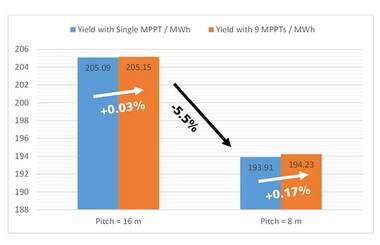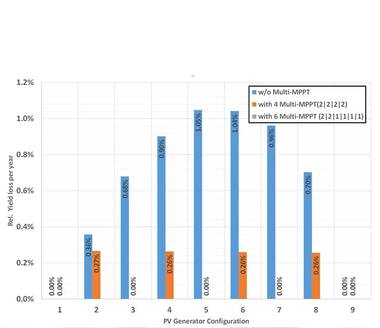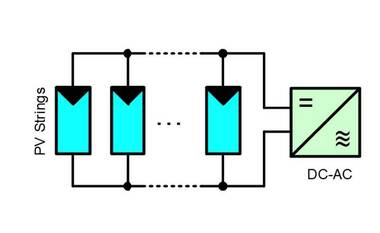Study on the possible yield gain with inverters with multi-MPPT compared to single-MPPT inverters for different solar system configurations and locations
Study conducted by Fraunhofer Institute for Solar Energy Systems ISE on behalf of KACO new energy GmbH
November 9, 2021
The study investigates whether and when the use of an inverter with multiple independent DC inputs is worthwhile. The focus of the study is on occurring mismatch losses between module strings. However, other effects such as input voltage windows of the inverters, efficiencies and the influence on the system design are also considered.
The research is based on yield simulations with the PVSyst software. To perform the study, synthetic inverters with multiple MPP trackers (MPPT) were generated based on real inverter parameters with one MPPT:
- blueplanet 60.0 TL3 M1 (single-MPPT)
- blueplanet 165 TL3 M1 (single-MPPT)
- blueplanet 60.0 TL3 M6 (synthetically generated inverter model with 6 MPPTs)
- blueplanet 165 TL3 M9 (synthetically generated inverter model with 9 MPPTs)
The synthetically generated multi-MPPT devices have the same efficiencies and other performance parameters as the single-MPPT inverters, since the sole purpose of the study is to determine the effects of multiple MPPT versus single-MPPT. In your own designs with other inverters, please consider their different efficiencies and input voltage windows, if applicable.
The simulated yield gains from the use of multi-MPPT inverters should therefore be understood as the theoretically maximum possible additional yield. In general, it can be assumed that the additional conversion stage will result in lower efficiency curves for two-stage inverters (multi-MPPT) compared to a single-stage (single-MPPT). This would likely reduce the yield gain.
The assumed applications are a rooftop system with 60 kVA inverters and a ground-mounted system based on 165 kVA inverters. Two sites were chosen for each: Arkona in northeastern Germany with a temperate climate and Abu Dhabi with hot climatic conditions.
The comparison is based on crystalline Si modules with an output of 410 Wp and with a southern orientation. 1000 V systems are considered for the rooftop application and 1500 V systems for the ground-mounted application.
Asymmetric string design
In order to evaluate the possible additional yield in the case of mismatch caused by asymmetric string design of the generator, yield simulations with different configurations were performed for the 60 kVA system.
For the generator configuration, the 8 strings connected in parallel were varied in length for this purpose, and different combinations of strings with 18 and 19 modules in series were considered. The largest mismatch losses occur with a 50/50 configuration of the PV generator. In this case, they amount to only 1.05% per year.
For other ratios, the losses decrease in both directions. The results show that even in this extreme case, the yield losses can still be considered relatively small.
Shading
In the study, different representative shading scenarios were investigated. With a tree centrally located 10 m in front of the generator, the yield difference in favor of multi-MPPT was also only 1% per year.
In addition, the effect of module shading by surrounding module tables for fixed mounting and by a tracker system was investigated for the ground-mounted systems. This depends on the selected distance between the module rows/tracker rows. For all cases investigated, the expected yield gain is less than 0.3% per year. The reason for this small mismatch are the module characteristics. A change in irradiance has only a very small influence on the MPP voltage over a very large range.

Efficiency
The authors are critical of the quality and accuracy of the component databases contained in PVSyst. There is insufficient quality assurance here, so that a comparison of components with very similar characteristics is not very reliable. Particularly in the case of inverters, large deviations from measured values for efficiency and model parameters were found here on a random basis.
Input voltage range
The extent to which a larger input voltage range for multi-MPPT inverters has a positive effect on the annual yield of a plant was also investigated by simulation.
For this purpose, yield simulations were carried out for the German town of Freiburg with weather data resolutions of 1 min / 15 min / 60 min. It was calculated how large the yield losses are due to falling below the lower voltage limit (caused by the single-MPPT inverter). With an appropriately adjusted generator design, these are completely negligible.
Summary
In summary, it can be said that multi-MPPT can make sense from a yield point of view if the system configuration is very heterogeneously connected or shading influences the string configuration. However, this requires a very high efficiency in the DC-DC stages of the inverter, so that the additional yield (~1 % in the very heterogeneous cases outlined) is not reduced too much by the potentially worse efficiency of a two-stage system.
For homogeneous systems, significant additional yield from multi-MPPT is not expected. With a uniform design of the string length, no yield increase is to be expected from the enlarged input voltage window either.
The calculations carried out refer entirely to the use of crystalline Si modules. Even when considering aging effects, this effect does not lead to yield losses due to mismatch or falling below the minimum inverter input voltage.
Download
The complete study by Fraunhofer ISE can be requested below via the contact form. In order to share the most important aspects of the study, please use the following download link:
Webinar
On February 28, 2022, we presented the results of the study in a pv magazine webinar together with Fraunhofer ISE.
Product information
KACO new energy has the most comprehensive product portfolio of single-MPPT inverters in the industry. Learn more about the inverters for residential and commercial PV as well as utility-scale solar power plants:



